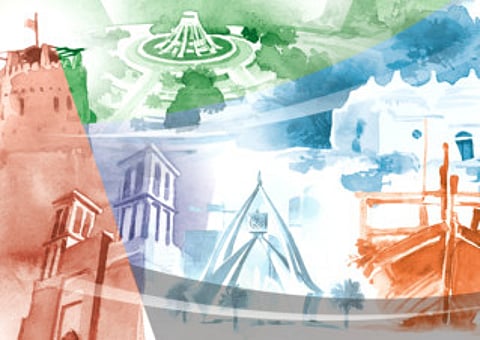Documenting a past steeped in heritage
Testimonies of people who have lived through major events

Many have written about the history of the UAE, but have conveyed only a small portion of what they know. Those who wrote provided useful facts for researchers in history, geography, sociology and politics. And for the picture to be complete, it is worth our while to encourage those who have not written yet to carry out this patriotic work because what they know is very useful and important to both current and future generations.
Some of those who have not written or published lived through very important eras in the UAE’s history and the events they witnessed were significant and led to the emergence of several Gulf entities.
The events that preceded the establishment of the UAE were very important in relation to the political orientations linked to the subsequent establishment of a nine-member federal entity and a seven-member federation. The era covered important dialogues and discussions with external parties in this context, which stretched from 1967 until the emergence of the Union in 1971 and beyond.
History also shows the great pressures exerted on the active elements for greater national unity, in addition to the pressure on those who undermined the idea and those who called for a part of the partition.
Despite all this, those dreaming of unity, the leaders of the march and the unknown soldiers were the bravest. And because they were true to their beliefs, their hopes and aspirations came true. The Union that was born was held together at its foundations by the leadership, the people and their good intentions. Those who have written about the history of the region in general and the history of the UAE before the Union have no doubt enriched the intellectual arena. They documented that era and their writings represented higher scientific research. Their works were credible — apart from those that held personal points of view, which are subject to scientific debate.
The UAE library is indebted to all the pioneers in this respect and on top of the list is His Highness Dr Shaikh Sultan Bin Mohammad Al Qasimi, Supreme Council Member and Ruler of Sharjah.
We cannot write the history of the UAE in isolation from the history of our neighbourhood. The neighbourhood in this case is wealthy, where we have Iran to the north, a republic that inherited an empire that ruled the world at one point alongside the Roman Empire. Persia in the pre-Islamic era was a place that had a rich history and incorporated areas beyond the geographical region containing the UAE. The presence of Persians in this region was not a transient one and it was not devoid of dominance and influence. Nor was it a harmless presence with no suppression and humiliation of its subjects.
Hence, the Persian state’s archive is biased. It will also lack credibility as it was proved by historical investigators that the animosity between the Persians and the Omani Arabs was a struggle for existence, as their wars went back to ancient times. Omani Arabs, led by Malek Bin Fahm Al Dawsi Al Azdi, ousted the Persians from the Omani Peninsula in 250 BC.
Source of information
The UAE’s southern neighbourhood is no less important. However, it is different in that people there are bound with the people in the UAE through marriage and blood relations.
The Omanis are not mere next-door neighbours. They are linked through kinship, geography, religion and heritage. Thus the Omani archive is the richest and absolutely monumental. Those who write history or the history of the UAE cannot avoid the Omani archive.
However, this archive has been subjected to corrosion. There have been interventions as a result of factional strife, which cannot be denied by investigators in its two historical capitals Muscat and Zanzibar.
Yet, that does not belittle the richness and status of this great heritage. This heritage is not the property of the Omani brothers alone, as the people of the UAE are their partners in this history.
Most importantly, one cannot write about the history of the region depending on a single source of information. Otherwise, the credibility of what is written will be questioned.
Given the release of various archives such as the Portuguese, Spanish, French, English, Russian and others, there is no excuse for one to rely on a single source of information.
The subject of multiple sources brings us to the importance of having a portfolio of recorded history — one in which testimonies of people who have lived through major events that preceded the emergence of the idea of the Union are recorded.
In this context, I would like to mention Ahmad Khalifa Al Suwaidi as one of the Union’s major architects, in view of the fact that he was Shaikh Zayed Bin Sultan Al Nahyan’s contemporary. He is also a wealth of information that is extremely essential to the UAE. And although his stock of information and memories are his right, there is no doubt that all the details represent a great gift that can be offered to future generations.
Dr Khalifa Rashid Al Shaali is an Emirati writer who specialises in legal affairs.
Sign up for the Daily Briefing
Get the latest news and updates straight to your inbox


